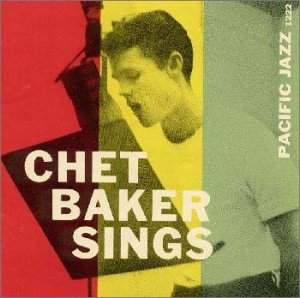Read the introduction and see the full album list here.
Take a few minutes and watch this video:
The trumpeter is Chet Baker, performing what might his best-known recording, ”My Funny Valentine,” in 1959 (probably in Europe). The comments below the video usually run something like, ”Phrasing by intuition,” ”What a bad-ass,” ”Wow.” Some contain information (all false) as to the missing front tooth visible in the clip – ”punched out by a heroin dealer,” etc. In fact, he never told the story of the missing front tooth, and when he lost many more teeth later in his life, he blamed it on a group of black men who, he alleged, ambushed him in an alleyway (none of the men were ever identified).
Yes, the voice and the trumpet tone are beautiful. But I have to disagree with the commenters who complain about the way this video shows Baker the man. The young Chet Baker is perhaps less of a musical icon than a visual one; his angelic voice and unsettlingly perfect good looks often prove far more captivating than his music, especially when paired with his life of excess. Chet is jazz’s Dorian Gray.
So I think of this video as very accurate. With his huge aviators and black gap of a front tooth, he looks frightening, like a skeleton; his voice is angelic, yes, but also careens wildly from note to note. His mouth is about an inch away from the microphone, which he seems not to even notice, and he clings to the stand is if he’d fall if he let go. The baritone player looks at him with a set expression. The band is all white.
Baker first sang ”My Funny Valentine” in 1954, and the rendition – a stark, melancholy one – was released on Dick Bock’s Pacific label two years later on the record Chet Baker Sings. And, although Chet Baker Sings is a great record, I don’t want it to be.
A good number of jazz musicians were, to put it kindly, less than gentlemen. Sonny Stitt once gave trumpeter Freddie Webster poisoned heroin and killed him – according to Miles Davis, who by his own admission once stole Clark Terry’s trumpet and pawned it. From Charlie Parker peeing on prostitutes to Philly Joe Jones stealing a truckload of records from Riverside’s warehouse to sell for drug money, the jazz pantheon is filled with, well, jerks. Of course, these jerks also made great music. Such is life.
Chet is different. Chet had that special gift of sucking the soul from other humans. He didn’t just not make the gig; he’d make the gig and screw your wife and get you addicted to painkillers and then disappear forever. If you were lucky, you’d live a full life without him. If you weren’t – and many weren’t, such as Baker accolyte Bobby Jaspar – you died an early death, or went to prison, or never, ever moved on. Not too many people showed up to Baker’s funeral.
However, if we judged all great artists on their personalities, we wouldn’t have much art. So what about the music?
Not all that great. I personally don’t subscribe to the whole ”Chet stole everything from Miles” argument. Everyone has influences, some stronger than others – Ambrose Akinmusire and Wynton Marsalis are both influenced by Clifford Brown, but it’s far more present in Wynton’s style than Akinmusire’s – and it’s no different with Chet and Miles. The problem is that Miles changed the conversation from influence to race, and although Chet was white, he always took care to acknowledge his debt to Miles (there’s a bootleg somewhere of a concert in Holland where Chet describes Miles as ”my favorite trumpet player – I guess you already knew that.”)
No, Chet’s music is mediocre for its own reasons – namely that Baker was too lazy to learn how to play the trumpet to the level that he should have reached. He had a great ear, and chose to rely on that rather than formal instruction. For some musicians, it worked. Not for Chet, whose range of tones and technical devices always seems to fall just short of what he has in mind. In the end, Chet Baker made a good deal of competent jazz records and several more incompetent ones, and he also wasn’t a great guy to hang around with.
Except for one thing. Chet Baker Sings.
With Chet Baker Sings, Baker shows us everything he could have done if he’d only cared a little bit more. What is ugly in 1959 is beautiful in 1954 and 1956; the trumpet is light instead of dull, his phrasing energetic and on the beat instead of struggling to keep pace. It’s Chet Baker Sings that gives us the duality between beautiful music and soulless personality. Without Chet Baker Sings, there is no Chet Baker.
Compare that 1959 ”My Funny Valentine” with this, the 1954 version:
Yes, there is ugliness behind the angelic voice; yes, there are limitations to the trumpet’s phrasing; the tooth was missing in 1954, too. But Baker worked hard on this record, and it shows. Perhaps it would have been better if he’d never made another record after this, so that we wouldn’t have to know about the true trajectory of his career. But in the end – like Dorian Gray – is purity of the past is always more interesting when we know about the evil that lay underneath.

